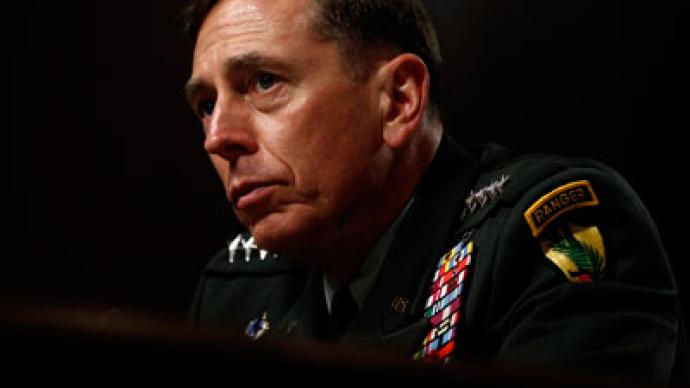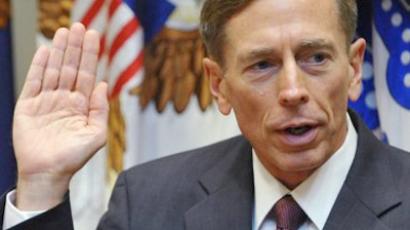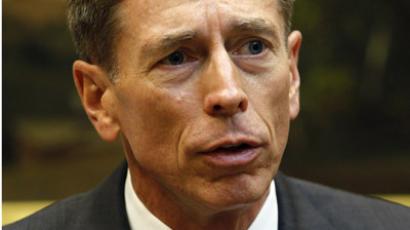Pain in the brass: Petraeus joins sullied trinity of fallen generals (Op-Ed)

The rise and fall of David Petraeus is perhaps the perfect allegory for an age of perpetual war. Generals can lose a fight if they win the battle of public opinion, if not, a camera will be there to watch them fall on their swords.
America loves a sex scandal. It fascinates, it titillates, and it cuts the powerful down to size. In the modern age, it is the perfect weapon to slay giants. A generation ago, journalists would not touch a public figure’s sexual peccadilloes with a ten-foot barge pole. Now, it has become the Kryptonite for the otherwise “invulnerable”, unless they have found a way like Bill Clinton to debate the meaning of the word “is.” That General David Petraeus would resign as CIA director over an “extramarital affair” is seemingly the perfect conclusion to a career built on public perception. Put it down to fate, or the machinations of his enemies, there could have been no more appropriate way to bring down the golden boy of “the media-military industrial complex.” But another pattern has emerged which raises more questions than it answers: what does the resignation of three four-star generals in three years, all tasked, at one time or another, with managing America’s mission in the graveyard of empires, say about the trajectory of the US war machine?
One by one
When General David D. McKiernan was replaced as commander of the International Security Assistance Force in Afghanistan in May 2009, it sent shockwaves through the Pentagon. The “rare decision to remove a wartime commander” demanded answers, and answers they got.
“[Defense Secretary Gates] and [chairman of the Joint Chief of Staff] Mullen had been having doubts about McKiernan since the beginning of the year. They regarded him as too languid, too old-school and too removed from Washington. He lacked the charisma and political savvy that Gen. David H. Petraeus brought to the Iraq war,” the Washington Post reported. Ironically, his replacement, General Stanley A. McChrystal, was seen as a media-friendly acolyte of the "Petraeus Doctrine" of counter insurgency. As part of the “new breed” of American commanders, he was lauded for being as comfortable hobnobbing with the press and Washington insiders as he was with men and women in uniform. Instituting policies virtually identical to those of McKiernan was not viewed as a strike against McChrystal.
Trashing top White House officials in a brazenly candid interview with Rolling Stone was a bridge too far, however, as McChrystal quickly became the second Afghan commander to get the boot in 13 months. Obama nominated Petraeus to take his place at the helm of the ISAF in June 2010. Writing for Esquire, Thomas Barnett was unequivocal about the general’s newly-found position: “Petraeus is truly untouchable.” And in a country where civilian casualties in a distant land rarely make headlines, perhaps he was right. But every untouchable has his Achilles heel.
The good soldier, the fall guy?
The wars in Afghanistan and Iraq are ultimately case studies in the Petraeus doctrine. The perceived effectiveness of his Iraqi troop surge provided enough breathing room for a US pullout, and the same strategy was soon after implemented in Afghanistan, with eyes on a 2014 troop withdrawal.
Michael Hastings, the journalist behind the Rolling Stone article which resulted in McChrystal’s ouster, recently wrote for Buzzfeed that spin was crucial to the Iraqi surge: “he [Petraeus] pulled off what is perhaps the most impressive con job in recent American history. He convinced the entire Washington establishment that we won the war.” Hastings characterized the policy as playing both sides in a civil war, a policy which resulted in the deaths of 800 American soldiers and exponentially more Iraqis. The sectarian fault lines resulting from this policy have left Iraq a powderkeg waiting to go off. But it doesn’t matter as far as the target audience is concerned. Quoting Petraeus’ 1987 Princeton dissertation, Hastings summed up the general’s professional philosophy:"What policymakers believe to have taken place in any particular case is what matters — more than what actually occurred." In that light, the fall of Petraeus coincides with the one tragedy he managed where the perception and what actually occurred intersected: Benghazi. During the Vice-Presidential Debate in October, Joe Biden was accused of throwing the CIA under the bus by insinuating the agency had provided faulty intelligence regarding the 9/11 attack on the US consulate in Benghazi which resulted in the death of U.S. Ambassador J. Christopher Stevens and three members of his diplomatic mission.
The defrocking of Petraeus came one step closer on November 1, when it was revealed that Hillary Clinton called Petraeus the night of the attack asking for help that never came. While the “State Department believed it had a formal agreement with the CIA to provide backup security…the CIA didn't have the same understanding about its security responsibilities," the Wall Street Journal reported. The writing was on the wall. Petraeus was set to testify in closed-door sessions before the intelligence committees of the Senate and House of Representatives on Thursday, and with the White House’s less than glowing review of his performance, he would have had a venue to vindicate himself. That “one of the greatest generals in a generation” resigned five days before speaking out has only spurred speculation that he is a patsy for a White House cover-up. His resignation coincidentally came a mere three days after Obama was re-elected, raising speculation regarding the timing of the general’s less-than-fortunate affair. And misery loves company, as the current head of ISAF forces in Afghanistan might soon learn. The nomination of US General John Allen as NATO’s Supreme Allied Commander in Europe was suspended over the probe into CIA Director David Petraeus. Allen was accused of exchanging “inappropriate” emails with a woman linked to Petraeus, though defense officials say the investigation will exonerate him. There is no definite answer as to why Petraeus was exposed when he was, or who might go down with him. It might have simply been bad timing. Maybe Petraeus would have taken the hit for Benghazi and stayed on like a good soldier. Whatever the case, a few questions must be asked: 1) How long did the White House know about the affair? 2) Did the Obama Administration ask the FBI to suppress information regarding the case until after Election Day and if so, why?
Live by the media, die by the media
The final cost of the wars in Iraq, Afghanistan (and by extension Pakistan) could run as high as $4.4 trillion when all is said and done. There have been over 3,000 coalition deaths in Afghanistan and 4,486 US troop deaths in Iraq. Civilian casualties run into the six digits. But affairs, off-color comments in music magazines and being more interested in the war one is prosecuting than “fawning” over visiting lawmakers and the Washington elite are sins that end military careers.
The New York Times wrote without irony following McChrystal’s resignation in June 2010:“General McChrystal demonstrated the perils of letting the public see too much of its commanders at war — and of his own shortfalls as the manager of his public image.”McKiernan for his part was too “old-school” to manage his public image, while Petraeus was an expert at it until he wasn’t.But the political forces which let loose the dogs of war have proven one simple reality in an age where triumph and perception are forever intertwined: it is better to keep up appearances in defeat than lose face for the sake of victory.
William Echols, RT














